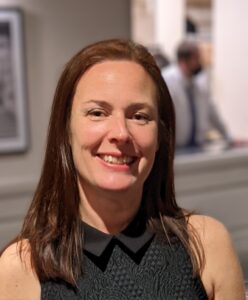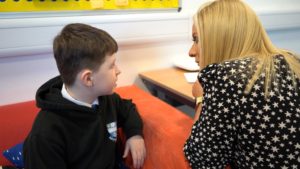YouthLink Scotland’s Education & Skills lead Marielle Bruce shares her experience of gathering the opinions of over 700 young people involved in Scottish youth work, highlighting their desire for educational reform for a more holistic learning experience.

Marielle is a key speaker at our upcoming online Policy Convention. and will be presenting on the integration of youth work into educational and employability systems in Scotland. Follow Marielle on LinkedIn.
This time last year I was collating the views of over 700 young people participating in youth work, as part of the National Discussion on Education. I was struck by the bravery of young people who spoke of feeling unheard, unseen, unsupported and unsafe in formal learning settings.
Many recognised that teachers are often confined within the limits of their role and ultimately bound by a system that they considered too focused only on preparing them for exams.
Young people said they need Scottish education to help them prepare for future life and work. In particular, they spoke about the importance of a holistic experience across settings that includes:
Overwhelmingly, I recall how emphatically and clearly young people spoke about the transformative impact of youth work. About their youth workers who create safe spaces and relevant opportunities to engage, learn and achieve.
Young people identified what needs to change across education, calling for education reform to ensure that every young person can access youth work as a fundamental element of their education.
It’s been my job and my privilege this year to amplify their collective voice. I’m delighted to have the opportunity to do so again as part of YouthLink Scotland’s Policy Convention.

The role of youth work within Scottish education is not currently sufficiently included, resourced, understood or valued.
Young people therefore do not have equitable access to the learning opportunities and experiences they need – and indeed are entitled to within Curriculum for Excellence.
YouthLink Scotland has responded to all aspects of lifelong learning and skills reform from a rights-based position, seeking the reforms to ensure that every child and young person can experience their right to an education. An education which develops their personality, talents and abilities to their fullest potential (UNCRC Article 29).
Our position is that an equitable and rights-based learning system must include access to youth work. This includes post-school.
In October, YouthLink Scotland worked with youth workers to consult young people as part of our response to the Scottish Government’s extended consultation on the National Discussion and Independent Review of Qualifications and Assessment. Young people identified their top priorities for change:
I hope young people taking part in youth work can see their views reflected in the renewed vision for Scottish education, in the ambition of the Independent Review of Qualifications and Assessment to recognise and value the diverse achievements of every learner and through James Withers’ call for parity of esteem between different types of learning and pathways.
This year’s Policy Convention provides a timely opportunity to continue to consider how lifelong learning and skills reform can ensure that every young person has equitable access to support and learning through youth work to reach beyond their potential.
The YouthLink Scotland Policy Convention aims to galvanise youth workers, managers and the wider sector by showcasing real progress in youth work’s policy agenda in Scotland.